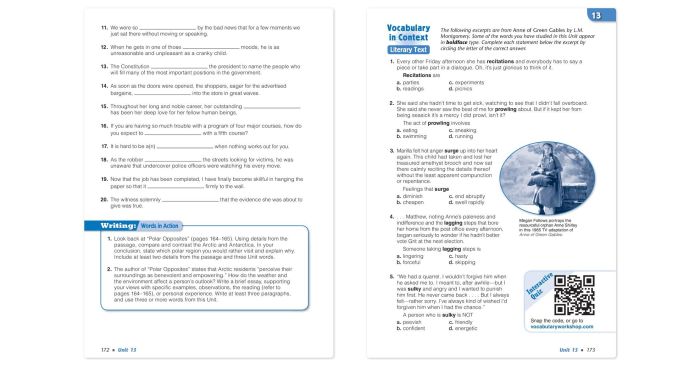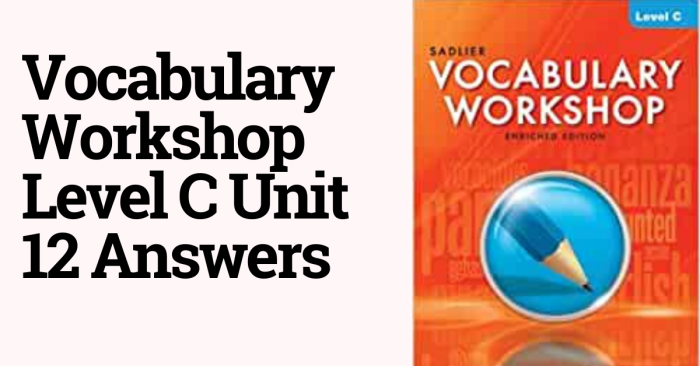Embark on an enriching journey with Vocabulary Workshop Unit 11 Level C, meticulously designed to bolster your vocabulary and linguistic prowess. This comprehensive unit caters to learners seeking to expand their lexical knowledge and master the art of effective communication.
Delving into the intricacies of word study and analysis, this unit empowers you to dissect words, unravel their components, and enhance your spelling and pronunciation. Through engaging activities, interactive tasks, and real-life scenarios, you will effortlessly absorb new vocabulary and witness your communication skills soar.
Vocabulary Workshop Unit 11 Level C Overview

Vocabulary Workshop Unit 11 Level C is designed to enhance vocabulary skills and foster language proficiency in learners. The unit focuses on expanding vocabulary, improving word usage, and developing comprehension abilities.
The unit is structured into distinct sections, each addressing a specific aspect of vocabulary development. It incorporates engaging activities, exercises, and examples to facilitate learning and retention.
Unit Structure and Organization
Unit 11 Level C consists of the following sections:
- Section 1: Word Roots and Affixes:Explores the role of word roots and affixes in vocabulary expansion.
- Section 2: Contextual Vocabulary:Emphasizes understanding vocabulary in context through authentic texts and real-life scenarios.
- Section 3: Word Relationships:Examines different types of word relationships, such as synonyms, antonyms, and homophones.
- Section 4: Vocabulary in Action:Provides opportunities to apply vocabulary knowledge in various writing and speaking tasks.
Vocabulary Building Activities
Vocabulary Workshop Unit 11 Level C employs a diverse range of engaging activities designed to enhance vocabulary acquisition and retention. These activities cater to various learning styles and preferences, providing learners with ample opportunities to interact with new words and reinforce their understanding.
Through interactive games, learners can engage in playful competitions that stimulate their vocabulary recall. Exercises, such as crossword puzzles and word searches, challenge learners to apply their vocabulary knowledge in a structured and thought-provoking manner. Additionally, interactive tasks encourage learners to engage with words in context, fostering a deeper comprehension of their usage and meaning.
Word Games
Word games, such as “Word Bingo” and “Charades,” provide a stimulating and enjoyable way for learners to practice their vocabulary skills. These games encourage active participation, promote social interaction, and create a fun and competitive learning environment.
For instance, in “Word Bingo,” learners listen to vocabulary words being called out and mark off the corresponding words on their bingo cards. This activity enhances listening comprehension, word recognition, and vocabulary retention.
Exercises
Exercises, such as “Crossword Puzzles” and “Word Searches,” offer a structured approach to vocabulary practice. These activities require learners to apply their vocabulary knowledge to solve puzzles, reinforcing word recognition and spelling.
For example, “Crossword Puzzles” challenge learners to complete a grid with words that match the given clues. This activity promotes problem-solving skills, improves word recall, and expands vocabulary.
Interactive Tasks
Interactive tasks, such as “Sentence Completion” and “Word Mapping,” encourage learners to engage with vocabulary in context. These activities foster a deeper understanding of word usage, sentence structure, and vocabulary interrelationships.
For instance, in “Sentence Completion,” learners complete sentences with appropriate vocabulary words. This activity promotes sentence construction, vocabulary application, and context-based learning.
Vocabulary in Context
Vocabulary Workshop Unit 11 Level C seamlessly integrates vocabulary into meaningful contexts, creating a rich and immersive learning experience for students.
Context is paramount in understanding and using vocabulary effectively. When words are encountered in isolation, their meanings can be ambiguous or incomplete. However, by embedding vocabulary within authentic contexts, such as reading passages, dialogues, and real-life situations, students gain a deeper understanding of how words are used and the nuances of their meanings.
Integration of Vocabulary into Reading Passages
- Reading passages are carefully selected to introduce new vocabulary in a meaningful context.
- Students are encouraged to read actively, paying attention to the usage of unfamiliar words.
- Comprehension questions and discussion prompts guide students in understanding the vocabulary in the context of the passage.
Vocabulary in Dialogues
- Dialogues present realistic conversations that model the use of target vocabulary.
- Students analyze the dialogue, identifying how vocabulary is used to express ideas and emotions.
- Role-playing activities allow students to practice using the vocabulary in authentic communication.
Vocabulary in Real-Life Situations
- Students are exposed to vocabulary through videos, articles, and simulations that reflect real-life scenarios.
- They learn how vocabulary is used in different settings and for various purposes.
- This exposure helps students develop a practical understanding of vocabulary usage.
Word Study and Analysis: Vocabulary Workshop Unit 11 Level C
Unit 11 Level C places significant emphasis on word study and analysis. Learners are encouraged to break down words into their constituent parts, such as prefixes, suffixes, and root words. This approach fosters a deeper understanding of vocabulary and enhances spelling and pronunciation.
Breaking Down Words
By dissecting words into their components, learners can identify patterns and relationships between words. For instance, recognizing the prefix “un-” as meaning “not” or “opposite of” allows learners to deduce the meaning of unfamiliar words like “unfair” or “unhappy.”
Improving Spelling and Pronunciation
Understanding word structure also improves spelling and pronunciation. Learners who can identify root words and affixes are better equipped to spell words correctly and pronounce them accurately. For example, knowing that the root word “dict” means “say” helps learners spell words like “dictate” and “diction” correctly.
Vocabulary Assessment
Vocabulary assessment is an integral part of the Vocabulary Workshop Unit 11 Level C. It helps track learners’ progress and identify areas for improvement. The unit employs various assessment methods to evaluate learners’ vocabulary acquisition and usage.
One of the key assessment methods is regular vocabulary quizzes. These quizzes test learners’ understanding of new vocabulary words and their ability to use them in context. The quizzes cover a range of question types, including multiple choice, fill-in-the-blank, and short answer questions.
This helps assess learners’ comprehension, recall, and application of the new vocabulary.
Progress Tracking
The regular vocabulary quizzes allow instructors to track learners’ progress over time. By comparing learners’ performance on successive quizzes, instructors can identify learners who are struggling with certain vocabulary concepts and provide them with additional support.
Identifying Areas for Improvement, Vocabulary workshop unit 11 level c
The quizzes also help identify areas where learners need additional support. For example, if a learner consistently performs poorly on questions related to a particular word or concept, it indicates that they need more practice with that specific vocabulary item.
Other Assessment Methods
In addition to regular vocabulary quizzes, the unit may also use other assessment methods, such as vocabulary logs or portfolios. Vocabulary logs require learners to keep a record of new vocabulary words they encounter and their definitions. This helps learners actively engage with new vocabulary and track their own progress.
Vocabulary portfolios, on the other hand, collect a variety of learner work related to vocabulary, such as essays, presentations, or creative writing pieces that demonstrate their vocabulary usage.
Technology Integration

Technology plays a crucial role in enhancing vocabulary learning and engagement in Unit 11 Level C.Interactive apps, online exercises, and digital resources are seamlessly integrated into the unit, providing students with immersive and engaging learning experiences. These technologies cater to diverse learning styles and make vocabulary acquisition more interactive and enjoyable.
Interactive Apps
Interactive apps offer gamified vocabulary exercises, such as puzzles, crosswords, and quizzes. These apps provide instant feedback, motivating students to learn and practice new words. They also foster friendly competition and collaboration among learners, creating a dynamic and engaging learning environment.
Online Exercises
Online exercises allow students to practice vocabulary in context through interactive exercises, such as fill-in-the-blank, multiple choice, and matching exercises. These exercises provide immediate feedback, enabling students to identify areas for improvement and reinforce their understanding of new words.
Digital Resources
Digital resources, such as online dictionaries, thesauruses, and multimedia content, provide students with easy access to additional information and support. These resources allow students to explore the nuances of words, find synonyms and antonyms, and enhance their comprehension of new vocabulary.
Lesson Plan Design

Lesson plans are essential for effective teaching, as they provide a roadmap for the lesson, ensuring that learning objectives are met and students are engaged throughout. When designing a lesson plan, it is important to consider the overall learning goals of the unit, as well as the specific objectives for each lesson.
One of the lessons in Unit 11 Level C of Vocabulary Workshop focuses on the vocabulary related to “Music and Entertainment.” The learning objectives for this lesson are:
- Students will be able to define and use 10 new vocabulary words related to music and entertainment.
- Students will be able to identify and describe different types of music and entertainment.
- Students will be able to write and speak about their own experiences with music and entertainment.
To achieve these objectives, the lesson plan includes a variety of activities, such as:
- A pre-reading discussion to activate students’ prior knowledge about music and entertainment.
- A reading passage that introduces the new vocabulary words and provides context for their use.
- Vocabulary practice activities, such as matching, fill-in-the-blank, and sentence writing.
- A listening activity that exposes students to different types of music and entertainment.
- A speaking activity that allows students to share their own experiences with music and entertainment.
The lesson plan also includes assessment strategies, such as a vocabulary quiz and a writing assignment, to evaluate students’ understanding of the new vocabulary words and their ability to use them in context.
This lesson plan is aligned with the overall learning goals of Unit 11 Level C, which is to improve students’ vocabulary skills and their ability to use language effectively in different contexts. By completing this lesson, students will expand their vocabulary related to music and entertainment, develop their listening and speaking skills, and gain confidence in their ability to communicate about their own experiences.
Questions and Answers
What is the target audience for Vocabulary Workshop Unit 11 Level C?
This unit is designed for learners who wish to enhance their vocabulary and improve their communication skills.
How does the unit integrate technology?
The unit incorporates interactive apps, online exercises, and digital resources to enhance vocabulary learning and engagement.
What types of assessment methods are used in the unit?
The unit employs various assessment methods, such as games, exercises, and interactive tasks, to evaluate learners’ vocabulary progress.